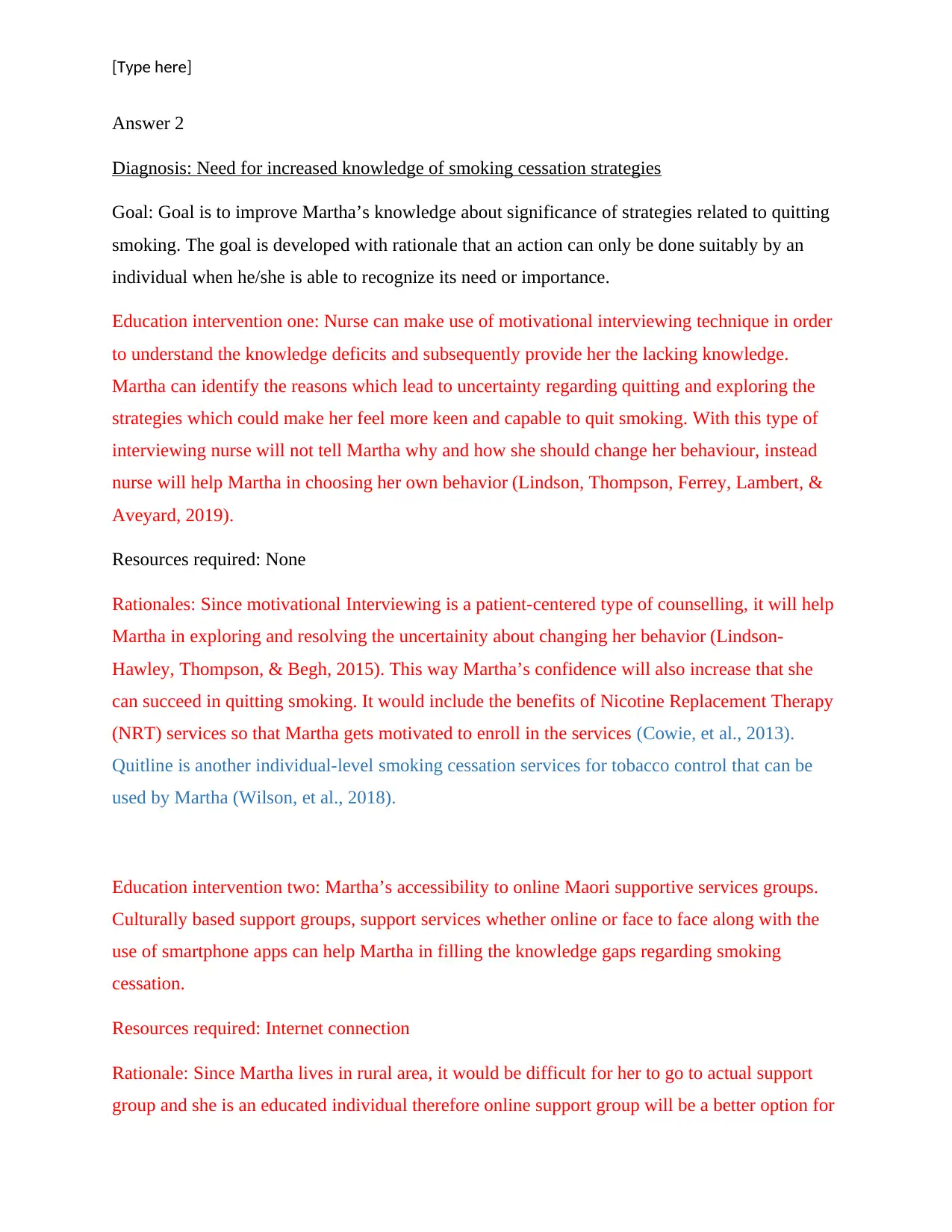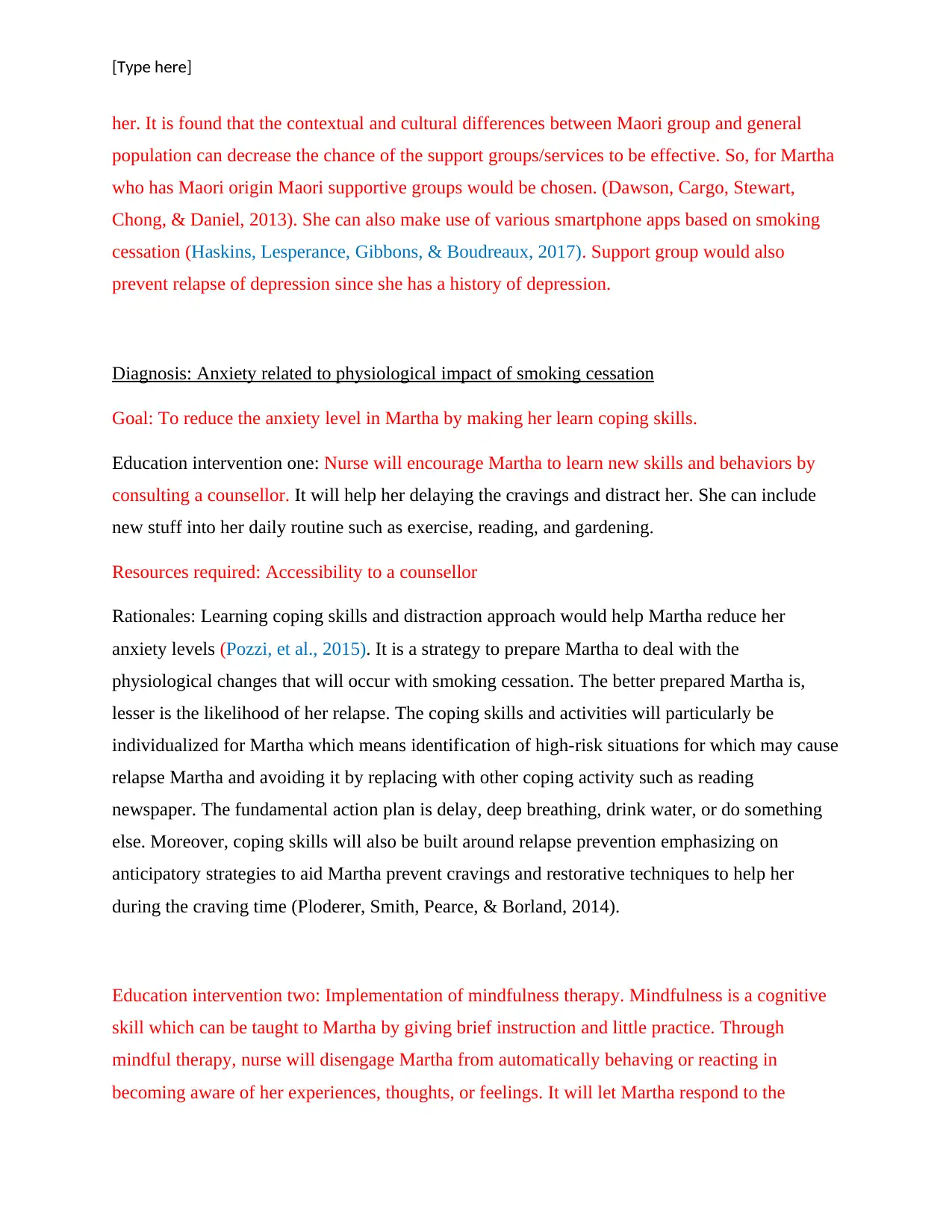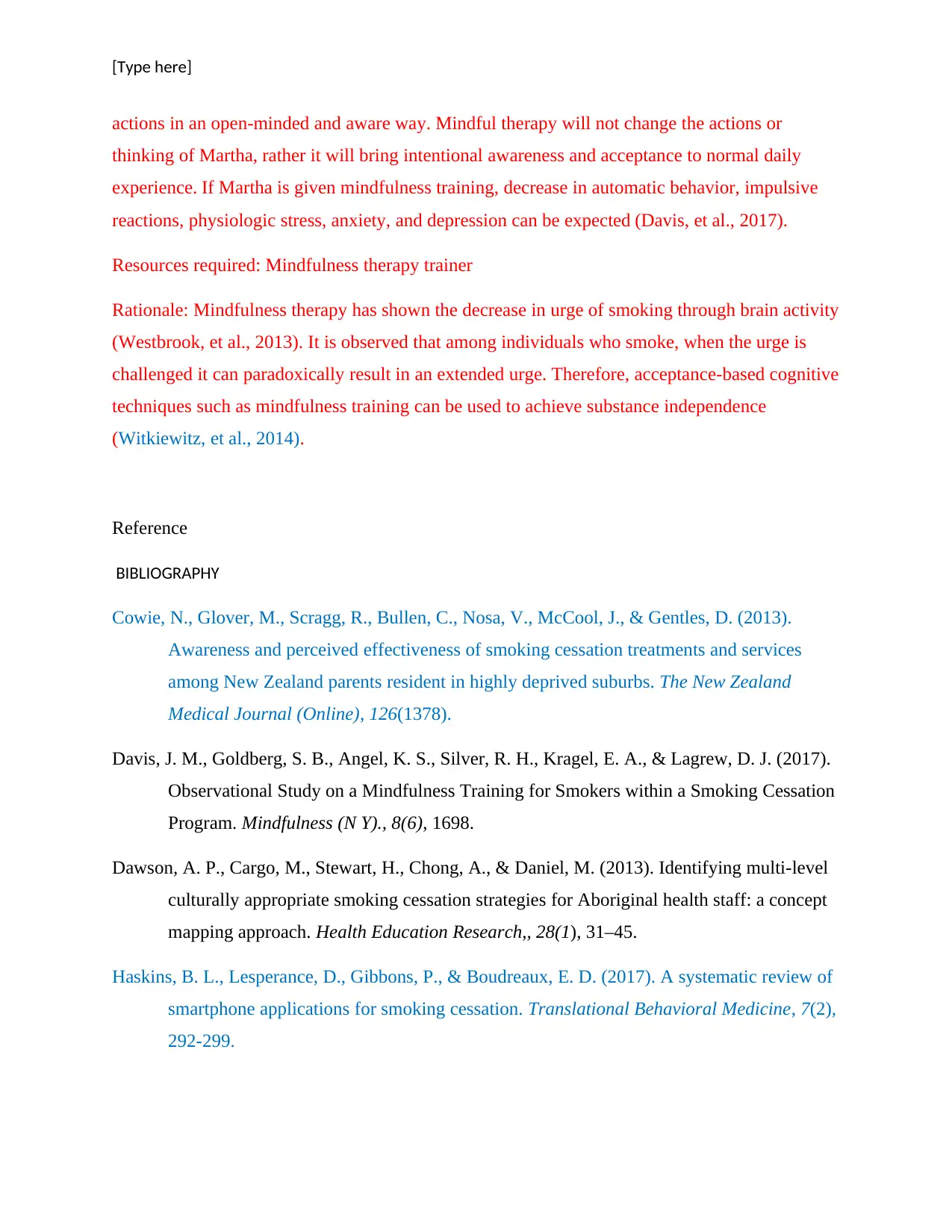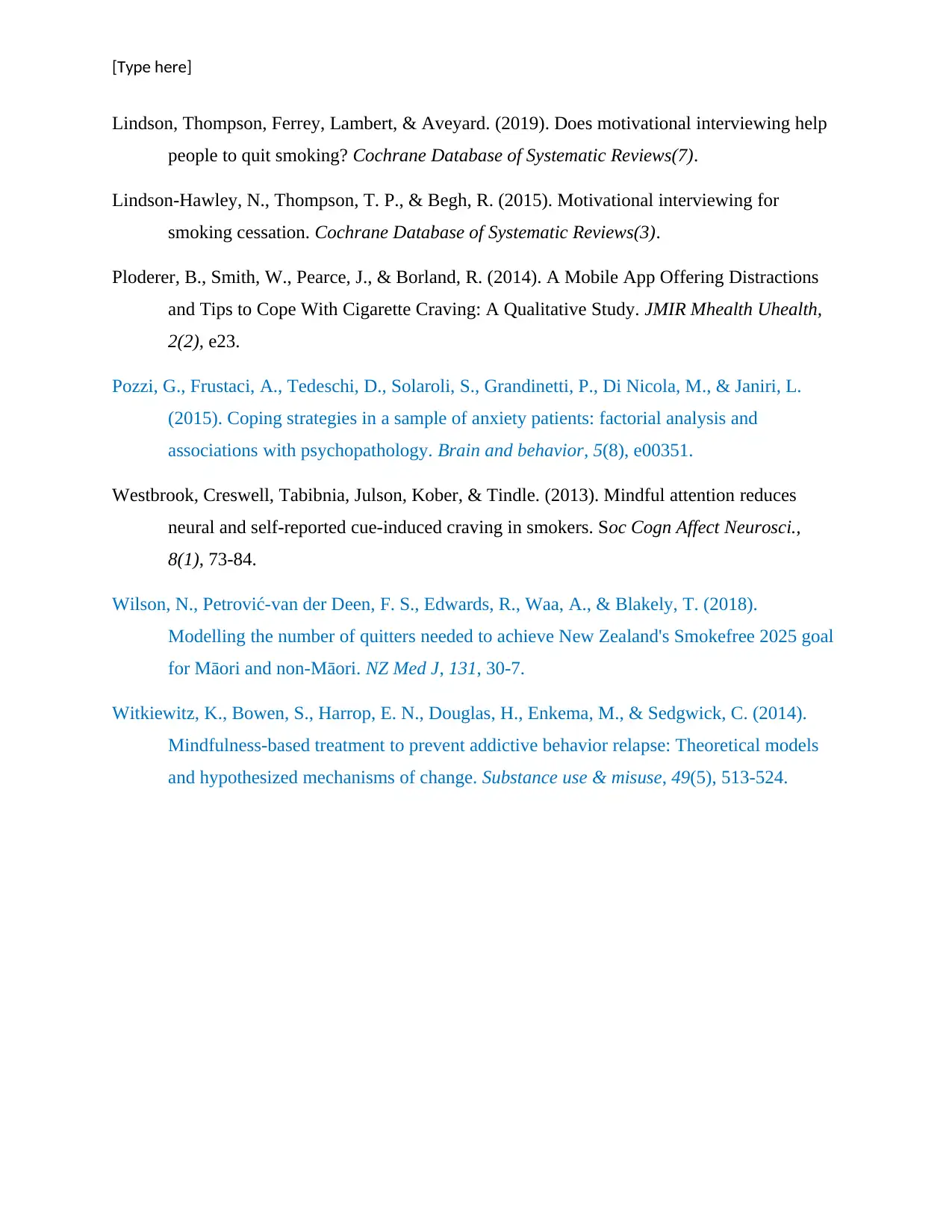Developing Smoking Cessation Strategies for Martha Myles' Care Plan
VerifiedAdded on 2022/09/27
|4
|1460
|20
Practical Assignment
AI Summary
This assignment focuses on developing and implementing smoking cessation strategies for Martha Myles, a 40-year-old Maori female patient admitted to the hospital after a car accident. The assignment addresses two primary diagnoses: the need for increased knowledge of smoking cessation strategies and anxiety related to the physiological impact of quitting smoking. The proposed interventions include motivational interviewing, access to online Maori supportive services, counselling, and mindfulness therapy. The rationale behind each intervention is provided, along with the resources required. The assignment emphasizes the importance of culturally sensitive care, patient-centered approaches, and the use of evidence-based practices to support Martha in her journey to quit smoking and manage her anxiety during the process. The interventions also include the use of coping skills and relapse prevention strategies.

[Type here]
Answer 2
Diagnosis: Need for increased knowledge of smoking cessation strategies
Goal: Goal is to improve Martha’s knowledge about significance of strategies related to quitting
smoking. The goal is developed with rationale that an action can only be done suitably by an
individual when he/she is able to recognize its need or importance.
Education intervention one: Nurse can make use of motivational interviewing technique in order
to understand the knowledge deficits and subsequently provide her the lacking knowledge.
Martha can identify the reasons which lead to uncertainty regarding quitting and exploring the
strategies which could make her feel more keen and capable to quit smoking. With this type of
interviewing nurse will not tell Martha why and how she should change her behaviour, instead
nurse will help Martha in choosing her own behavior (Lindson, Thompson, Ferrey, Lambert, &
Aveyard, 2019).
Resources required: None
Rationales: Since motivational Interviewing is a patient-centered type of counselling, it will help
Martha in exploring and resolving the uncertainity about changing her behavior (Lindson‐
Hawley, Thompson, & Begh, 2015). This way Martha’s confidence will also increase that she
can succeed in quitting smoking. It would include the benefits of Nicotine Replacement Therapy
(NRT) services so that Martha gets motivated to enroll in the services (Cowie, et al., 2013).
Quitline is another individual-level smoking cessation services for tobacco control that can be
used by Martha (Wilson, et al., 2018).
Education intervention two: Martha’s accessibility to online Maori supportive services groups.
Culturally based support groups, support services whether online or face to face along with the
use of smartphone apps can help Martha in filling the knowledge gaps regarding smoking
cessation.
Resources required: Internet connection
Rationale: Since Martha lives in rural area, it would be difficult for her to go to actual support
group and she is an educated individual therefore online support group will be a better option for
Answer 2
Diagnosis: Need for increased knowledge of smoking cessation strategies
Goal: Goal is to improve Martha’s knowledge about significance of strategies related to quitting
smoking. The goal is developed with rationale that an action can only be done suitably by an
individual when he/she is able to recognize its need or importance.
Education intervention one: Nurse can make use of motivational interviewing technique in order
to understand the knowledge deficits and subsequently provide her the lacking knowledge.
Martha can identify the reasons which lead to uncertainty regarding quitting and exploring the
strategies which could make her feel more keen and capable to quit smoking. With this type of
interviewing nurse will not tell Martha why and how she should change her behaviour, instead
nurse will help Martha in choosing her own behavior (Lindson, Thompson, Ferrey, Lambert, &
Aveyard, 2019).
Resources required: None
Rationales: Since motivational Interviewing is a patient-centered type of counselling, it will help
Martha in exploring and resolving the uncertainity about changing her behavior (Lindson‐
Hawley, Thompson, & Begh, 2015). This way Martha’s confidence will also increase that she
can succeed in quitting smoking. It would include the benefits of Nicotine Replacement Therapy
(NRT) services so that Martha gets motivated to enroll in the services (Cowie, et al., 2013).
Quitline is another individual-level smoking cessation services for tobacco control that can be
used by Martha (Wilson, et al., 2018).
Education intervention two: Martha’s accessibility to online Maori supportive services groups.
Culturally based support groups, support services whether online or face to face along with the
use of smartphone apps can help Martha in filling the knowledge gaps regarding smoking
cessation.
Resources required: Internet connection
Rationale: Since Martha lives in rural area, it would be difficult for her to go to actual support
group and she is an educated individual therefore online support group will be a better option for
Paraphrase This Document
Need a fresh take? Get an instant paraphrase of this document with our AI Paraphraser

[Type here]
her. It is found that the contextual and cultural differences between Maori group and general
population can decrease the chance of the support groups/services to be effective. So, for Martha
who has Maori origin Maori supportive groups would be chosen. (Dawson, Cargo, Stewart,
Chong, & Daniel, 2013). She can also make use of various smartphone apps based on smoking
cessation (Haskins, Lesperance, Gibbons, & Boudreaux, 2017). Support group would also
prevent relapse of depression since she has a history of depression.
Diagnosis: Anxiety related to physiological impact of smoking cessation
Goal: To reduce the anxiety level in Martha by making her learn coping skills.
Education intervention one: Nurse will encourage Martha to learn new skills and behaviors by
consulting a counsellor. It will help her delaying the cravings and distract her. She can include
new stuff into her daily routine such as exercise, reading, and gardening.
Resources required: Accessibility to a counsellor
Rationales: Learning coping skills and distraction approach would help Martha reduce her
anxiety levels (Pozzi, et al., 2015). It is a strategy to prepare Martha to deal with the
physiological changes that will occur with smoking cessation. The better prepared Martha is,
lesser is the likelihood of her relapse. The coping skills and activities will particularly be
individualized for Martha which means identification of high-risk situations for which may cause
relapse Martha and avoiding it by replacing with other coping activity such as reading
newspaper. The fundamental action plan is delay, deep breathing, drink water, or do something
else. Moreover, coping skills will also be built around relapse prevention emphasizing on
anticipatory strategies to aid Martha prevent cravings and restorative techniques to help her
during the craving time (Ploderer, Smith, Pearce, & Borland, 2014).
Education intervention two: Implementation of mindfulness therapy. Mindfulness is a cognitive
skill which can be taught to Martha by giving brief instruction and little practice. Through
mindful therapy, nurse will disengage Martha from automatically behaving or reacting in
becoming aware of her experiences, thoughts, or feelings. It will let Martha respond to the
her. It is found that the contextual and cultural differences between Maori group and general
population can decrease the chance of the support groups/services to be effective. So, for Martha
who has Maori origin Maori supportive groups would be chosen. (Dawson, Cargo, Stewart,
Chong, & Daniel, 2013). She can also make use of various smartphone apps based on smoking
cessation (Haskins, Lesperance, Gibbons, & Boudreaux, 2017). Support group would also
prevent relapse of depression since she has a history of depression.
Diagnosis: Anxiety related to physiological impact of smoking cessation
Goal: To reduce the anxiety level in Martha by making her learn coping skills.
Education intervention one: Nurse will encourage Martha to learn new skills and behaviors by
consulting a counsellor. It will help her delaying the cravings and distract her. She can include
new stuff into her daily routine such as exercise, reading, and gardening.
Resources required: Accessibility to a counsellor
Rationales: Learning coping skills and distraction approach would help Martha reduce her
anxiety levels (Pozzi, et al., 2015). It is a strategy to prepare Martha to deal with the
physiological changes that will occur with smoking cessation. The better prepared Martha is,
lesser is the likelihood of her relapse. The coping skills and activities will particularly be
individualized for Martha which means identification of high-risk situations for which may cause
relapse Martha and avoiding it by replacing with other coping activity such as reading
newspaper. The fundamental action plan is delay, deep breathing, drink water, or do something
else. Moreover, coping skills will also be built around relapse prevention emphasizing on
anticipatory strategies to aid Martha prevent cravings and restorative techniques to help her
during the craving time (Ploderer, Smith, Pearce, & Borland, 2014).
Education intervention two: Implementation of mindfulness therapy. Mindfulness is a cognitive
skill which can be taught to Martha by giving brief instruction and little practice. Through
mindful therapy, nurse will disengage Martha from automatically behaving or reacting in
becoming aware of her experiences, thoughts, or feelings. It will let Martha respond to the

[Type here]
actions in an open-minded and aware way. Mindful therapy will not change the actions or
thinking of Martha, rather it will bring intentional awareness and acceptance to normal daily
experience. If Martha is given mindfulness training, decrease in automatic behavior, impulsive
reactions, physiologic stress, anxiety, and depression can be expected (Davis, et al., 2017).
Resources required: Mindfulness therapy trainer
Rationale: Mindfulness therapy has shown the decrease in urge of smoking through brain activity
(Westbrook, et al., 2013). It is observed that among individuals who smoke, when the urge is
challenged it can paradoxically result in an extended urge. Therefore, acceptance-based cognitive
techniques such as mindfulness training can be used to achieve substance independence
(Witkiewitz, et al., 2014).
Reference
BIBLIOGRAPHY
Cowie, N., Glover, M., Scragg, R., Bullen, C., Nosa, V., McCool, J., & Gentles, D. (2013).
Awareness and perceived effectiveness of smoking cessation treatments and services
among New Zealand parents resident in highly deprived suburbs. The New Zealand
Medical Journal (Online), 126(1378).
Davis, J. M., Goldberg, S. B., Angel, K. S., Silver, R. H., Kragel, E. A., & Lagrew, D. J. (2017).
Observational Study on a Mindfulness Training for Smokers within a Smoking Cessation
Program. Mindfulness (N Y)., 8(6), 1698.
Dawson, A. P., Cargo, M., Stewart, H., Chong, A., & Daniel, M. (2013). Identifying multi-level
culturally appropriate smoking cessation strategies for Aboriginal health staff: a concept
mapping approach. Health Education Research,, 28(1), 31–45.
Haskins, B. L., Lesperance, D., Gibbons, P., & Boudreaux, E. D. (2017). A systematic review of
smartphone applications for smoking cessation. Translational Behavioral Medicine, 7(2),
292-299.
actions in an open-minded and aware way. Mindful therapy will not change the actions or
thinking of Martha, rather it will bring intentional awareness and acceptance to normal daily
experience. If Martha is given mindfulness training, decrease in automatic behavior, impulsive
reactions, physiologic stress, anxiety, and depression can be expected (Davis, et al., 2017).
Resources required: Mindfulness therapy trainer
Rationale: Mindfulness therapy has shown the decrease in urge of smoking through brain activity
(Westbrook, et al., 2013). It is observed that among individuals who smoke, when the urge is
challenged it can paradoxically result in an extended urge. Therefore, acceptance-based cognitive
techniques such as mindfulness training can be used to achieve substance independence
(Witkiewitz, et al., 2014).
Reference
BIBLIOGRAPHY
Cowie, N., Glover, M., Scragg, R., Bullen, C., Nosa, V., McCool, J., & Gentles, D. (2013).
Awareness and perceived effectiveness of smoking cessation treatments and services
among New Zealand parents resident in highly deprived suburbs. The New Zealand
Medical Journal (Online), 126(1378).
Davis, J. M., Goldberg, S. B., Angel, K. S., Silver, R. H., Kragel, E. A., & Lagrew, D. J. (2017).
Observational Study on a Mindfulness Training for Smokers within a Smoking Cessation
Program. Mindfulness (N Y)., 8(6), 1698.
Dawson, A. P., Cargo, M., Stewart, H., Chong, A., & Daniel, M. (2013). Identifying multi-level
culturally appropriate smoking cessation strategies for Aboriginal health staff: a concept
mapping approach. Health Education Research,, 28(1), 31–45.
Haskins, B. L., Lesperance, D., Gibbons, P., & Boudreaux, E. D. (2017). A systematic review of
smartphone applications for smoking cessation. Translational Behavioral Medicine, 7(2),
292-299.
⊘ This is a preview!⊘
Do you want full access?
Subscribe today to unlock all pages.

Trusted by 1+ million students worldwide

[Type here]
Lindson, Thompson, Ferrey, Lambert, & Aveyard. (2019). Does motivational interviewing help
people to quit smoking? Cochrane Database of Systematic Reviews(7).
Lindson‐Hawley, N., Thompson, T. P., & Begh, R. (2015). Motivational interviewing for
smoking cessation. Cochrane Database of Systematic Reviews(3).
Ploderer, B., Smith, W., Pearce, J., & Borland, R. (2014). A Mobile App Offering Distractions
and Tips to Cope With Cigarette Craving: A Qualitative Study. JMIR Mhealth Uhealth,
2(2), e23.
Pozzi, G., Frustaci, A., Tedeschi, D., Solaroli, S., Grandinetti, P., Di Nicola, M., & Janiri, L.
(2015). Coping strategies in a sample of anxiety patients: factorial analysis and
associations with psychopathology. Brain and behavior, 5(8), e00351.
Westbrook, Creswell, Tabibnia, Julson, Kober, & Tindle. (2013). Mindful attention reduces
neural and self-reported cue-induced craving in smokers. Soc Cogn Affect Neurosci.,
8(1), 73-84.
Wilson, N., Petrović-van der Deen, F. S., Edwards, R., Waa, A., & Blakely, T. (2018).
Modelling the number of quitters needed to achieve New Zealand's Smokefree 2025 goal
for Māori and non-Māori. NZ Med J, 131, 30-7.
Witkiewitz, K., Bowen, S., Harrop, E. N., Douglas, H., Enkema, M., & Sedgwick, C. (2014).
Mindfulness-based treatment to prevent addictive behavior relapse: Theoretical models
and hypothesized mechanisms of change. Substance use & misuse, 49(5), 513-524.
Lindson, Thompson, Ferrey, Lambert, & Aveyard. (2019). Does motivational interviewing help
people to quit smoking? Cochrane Database of Systematic Reviews(7).
Lindson‐Hawley, N., Thompson, T. P., & Begh, R. (2015). Motivational interviewing for
smoking cessation. Cochrane Database of Systematic Reviews(3).
Ploderer, B., Smith, W., Pearce, J., & Borland, R. (2014). A Mobile App Offering Distractions
and Tips to Cope With Cigarette Craving: A Qualitative Study. JMIR Mhealth Uhealth,
2(2), e23.
Pozzi, G., Frustaci, A., Tedeschi, D., Solaroli, S., Grandinetti, P., Di Nicola, M., & Janiri, L.
(2015). Coping strategies in a sample of anxiety patients: factorial analysis and
associations with psychopathology. Brain and behavior, 5(8), e00351.
Westbrook, Creswell, Tabibnia, Julson, Kober, & Tindle. (2013). Mindful attention reduces
neural and self-reported cue-induced craving in smokers. Soc Cogn Affect Neurosci.,
8(1), 73-84.
Wilson, N., Petrović-van der Deen, F. S., Edwards, R., Waa, A., & Blakely, T. (2018).
Modelling the number of quitters needed to achieve New Zealand's Smokefree 2025 goal
for Māori and non-Māori. NZ Med J, 131, 30-7.
Witkiewitz, K., Bowen, S., Harrop, E. N., Douglas, H., Enkema, M., & Sedgwick, C. (2014).
Mindfulness-based treatment to prevent addictive behavior relapse: Theoretical models
and hypothesized mechanisms of change. Substance use & misuse, 49(5), 513-524.
1 out of 4
Your All-in-One AI-Powered Toolkit for Academic Success.
+13062052269
info@desklib.com
Available 24*7 on WhatsApp / Email
![[object Object]](/_next/static/media/star-bottom.7253800d.svg)
Unlock your academic potential
Copyright © 2020–2026 A2Z Services. All Rights Reserved. Developed and managed by ZUCOL.


